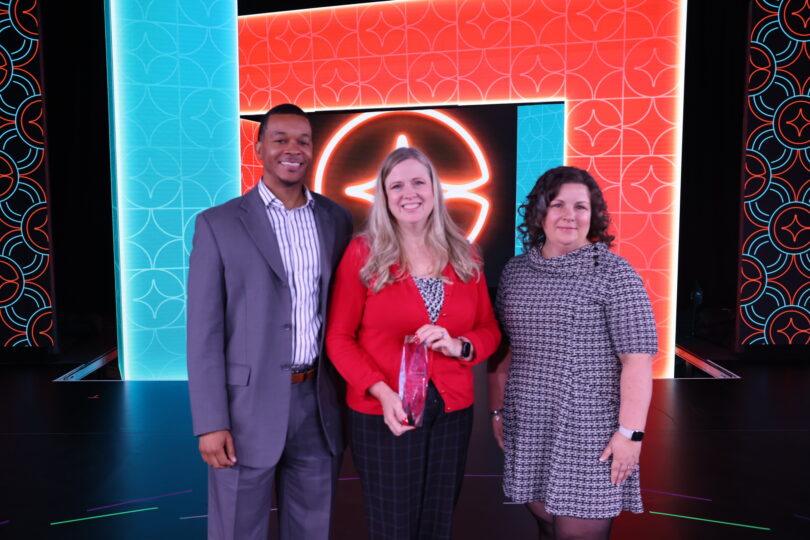The University of Georgia received the 2022 Learning & Development RAVE Award from Cornerstone, the software company powering UGA’s Professional Education Portal (PEP). The award was presented on Oct. 20 at Cornerstone’s Convergence conference in Las Vegas, Nevada. Other finalists for the award include Deloitte, Kraft-Heinz and Panda Restaurant Group.
Administered by University Human Resources, PEP functions as a learning management system, which houses, disseminates and tracks training and other professional development opportunities for faculty and staff. The award recognizes the university’s innovative use of PEP to create a health records and appointment management system supporting UGA’s Research Occupational Health and Safety Program.
“I am incredibly proud that the University of Georgia has received this recognition,” said Leslie Rogers, director of Learning and Development. “Winning the Cornerstone RAVE Award showcases how PEP can be utilized in a myriad of ways to best suit the needs of units across campus. Learning and Development is eager to partner with individual units and to support the university community by offering professional growth opportunities for all faculty and staff.”
Training new investigators
Researchers require occupational health services, such as vaccines, flu shots and tuberculosis testing, before they can begin work. In spring 2019, UGA opened an in-house preventive health care clinic on the Health Sciences Campus to support UGA’s growing research enterprise and demand for these services.
At the time, the clinic employed one full-time nurse, Jenney Roundtree, who also performed all the administrative responsibilities.
“That’s a lot for one person to manage,” said Lisa Kelly, support services director for the Office of Research, Integrity and Safety (ORIS). Kelly knew the clinic needed an employee health records management system to streamline operations. But with limited resources, she had to get creative.
In addition to her role with the Office of Research, Kelly also serves as the director of PEP, which launched in summer 2018 to help the university meet research training requirements.
“Lisa championed the cause for PEP every step of the way,” said Christopher King, associate vice president for ORIS. “Its positive impact was realized almost immediately, and since then, its use and application across campus have expanded exponentially.”
By spring 2019, PEP had generated considerable interest not just for meeting research training needs, but also for other professional development opportunities.
As Kelly considered the Occupational Health and Safety Program’s dilemma, she turned her attention back to PEP.
“I wanted to see if we could use the functionality of [PEP] to meet the rather unconventional needs that we had for a health care tracking system,” she said.
After establishing a few processes within the portal, the clinic had a fully operational health records management system in a matter of weeks. The new system allowed participants to register for services, track their processing status and access their service records, which helped decrease the clinic’s turnaround time from 75 days to 14 and saved the institution an average of 61,0000 working days per year for the estimated 1,000 researchers served annually.
Innovative problem solving
Tying occupational health services to the same system as training also had other unexpected benefits.
“It was a sweet marriage because, in some ways, training is its own preventative health care service,” Kelly said. “If you are trained, you tend to be safer, operate better and know what you’re doing; you’re less likely to get hurt.”
Kelly hopes this new one-stop shop for training and health reporting will make it easier to continue the culture of safety within lab spaces on campus. She also encourages schools and units to rethink how PEP and other in-house platforms can benefit them in new ways.
Don’t just think outside the box, she said; think like there is no box.
“We need to be innovative and creative in reimagining how we can use some of the tools we already have to meet some really pressing needs, particularly for staff at the institution. If we can be creative enough in using tools to help people become better versions of themselves, become more marketable with their skills and more agile, that’s incredibly important,” Kelly said.
PEP is a key component of Engage and Learn, a comprehensive learning and professional development program launched by the President Jere W. Morehead in 2019. PEP currently serves 54,000 active users and offers over 2,500 unique training courses from 15 units across the university. Topics range from onboarding and cybersecurity to ethics and the Certificate in Diversity and Inclusion. Last year, faculty and staff completed nearly 90,000 courses in PEP.








